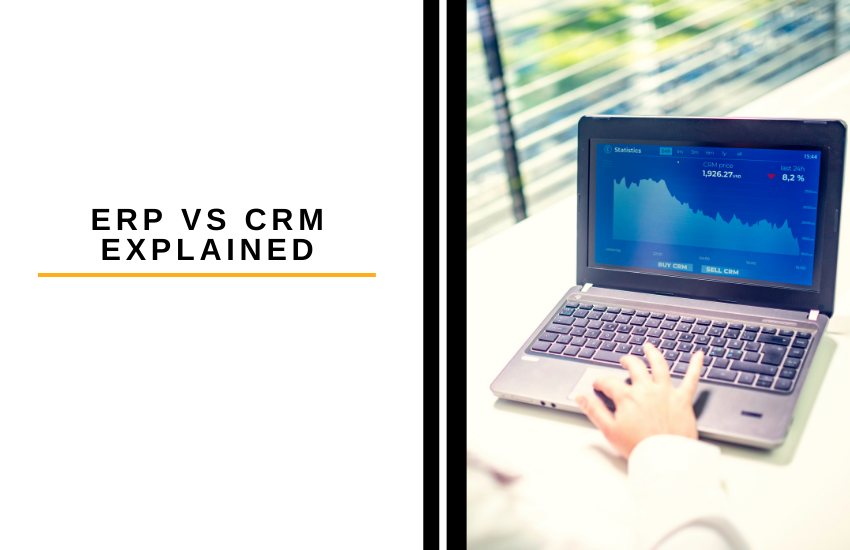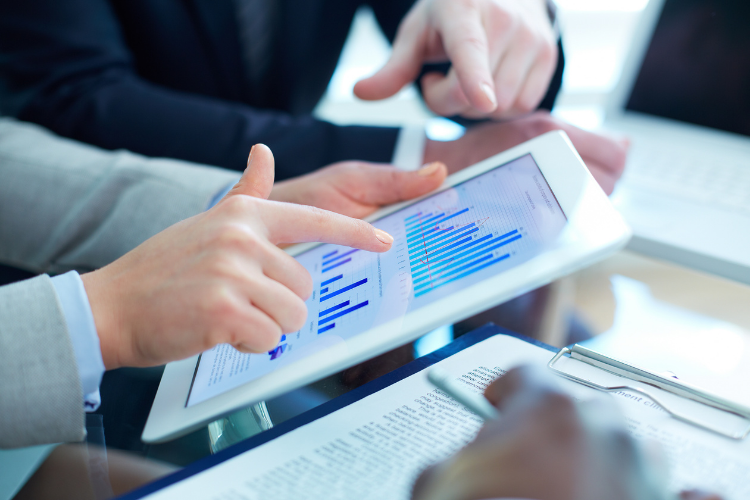- Main Differences Between ERP vs CRM
- What is an ERP?
- What is a CRM?
- Who ERP Software is For
- Who CRM Software is For
- The Top Features of ERP Software
- The Top Features of CRM Software
- The Benefits of ERP Software
- The Benefits of CRM Software
- What are the Similarities Between ERP and CRM Software?
- What are the Differences Between ERP and CRM Software?
- Do I Need CRM or ERP or Both?
- ERP vs CRM FAQs
- ERP vs CRM - Conclusion
Last Updated on July 19, 2023 by Ewen Finser
If you’re a business owner, then you know that there are a lot of different software systems out there that can help make your life easier. You may have heard of ERP vs CRM systems, but you may not know what the difference is between them.
However, two of the most popular types of software for improving your productivity are ERP and CRM systems.
In this blog post, we will cover everything you need to know about the two systems! We’ll start by explaining what each system is for. Then, we’ll discuss the top features of each system. Finally, we’ll talk about the benefits of each system.
Main Differences Between ERP vs CRM
The main differences between an ERP vs CRM are:
- ERP systems mainly handle financial data, whereas CRM systems mainly focus on customer data
- ERP systems would typically be used by a finance department of a business, whereas CRM systems are typically used by the sales team
- ERP systems serve as the main hub for financial and operational data whereas, in comparison, CRM systems serve as the central place for customer data and customer interactions.
What is an ERP?
An ERP system, or enterprise resource planning system, is a software application that helps businesses manage their internal operations. It is designed to streamline and automate various business processes, including accounting, inventory management, order fulfillment, and more.
What is a CRM?
A CRM system, or customer relationship management system, is a software application that helps businesses manage their customer relationships. It is designed to help businesses track and manage customer data, including contact information, purchase history, and more.
Who ERP Software is For
ERP software is designed for businesses of all sizes. Whether you run a small business or a large corporation, an ERP system can help you manage your operations more efficiently.
Who CRM Software is For
CRM software is also designed for businesses of all sizes. However, it is often used by businesses that have a large customer base, as it can help them manage their customer relationships more effectively.
The Top Features of ERP Software
There are a variety of features that come with ERP software. However, some of the most popular features include:
Financial Management
This part of ERP software can help businesses manage their finances, including invoicing, budgeting, and financial reporting.
For most businesses, being able to manage their finances is essential, and so this is a key feature of ERP software. Not only does it make financial management easier, but it can also help businesses save time and money.
Inventory Management
Another key feature of ERP software is inventory management. This part of the software can help businesses track their inventory levels, and also manage their stock. This is important for businesses that have a large inventory, as it can help them manage their stock levels, and essentially save money by preventing stock waste.
Order Management
This is a feature that is designed to help businesses manage their orders. It can help businesses track customer orders, and also manage the fulfillment process. Most businesses will order some sort of stock whether this is products, materials, or services, and so being able to effectively manage orders can be vital.
Accounting
Not only will businesses need financial management, but they’ll also need to be able to effectively manage their accounts. Accounting can help businesses track their income and expenditure, as well as manage their financial reports.
This is essential for businesses of all sizes, as it can help them stay on top of their finances and ensure that they are making a profit.
Production Management
When it comes to businesses that manufacture products, production management is an essential part of the process.
This feature can help businesses track their production progress, and also manage their production schedules. It can also help businesses manage their production process, including planning, scheduling, and quality control.
Supply Chain Management
Managing a supply chain involves everything from sourcing suppliers to managing inventory levels. This is a complex process, and so supply chain management is a key feature of ERP software. It can help businesses track their supply chain, and also manage their supplier connections.
This is especially important for businesses that have a large or complex supply chain, as it can help them stay organized, save time, save money, and maintain good relationships with clients.
Warehouse Management
Of course, when you’re dealing with a great deal of stock, you’ll need somewhere to keep it. This is where warehouse management comes in.
This feature can help businesses manage their warehouse, including stock levels, stock movement, and warehouse security. For businesses that have a large or complex warehouse, this can be an essential part of their operations.
Procurement
Last but not least, another of the top features of ERP software is procurement features. Procurement is the process of sourcing and buying goods and services, and so this feature can help businesses manage their purchasing.
It can help businesses track their supplier relationships, manage their suppliers, and also manage their purchasing process, including purchase orders, and contract management.
This is important for businesses of all sizes, as it can help them save time and money when sourcing goods and services. For businesses that rely on procurement, this can be a vital part of their operations.
These are just some of the top features that come with ERP software. As you can see, ERP software is designed to help businesses with a wide range of needs.
Whether you need financial management, inventory management, order management, or something else, ERP software can help. If you’re looking for a comprehensive solution for your business, then ERP software is definitely worth considering.
The Top Features of CRM Software
Now that we’ve covered the top features of ERP software, let’s take a look at the top features of CRM software, and compare the ERP vs CRM features:
Client Management
Client management features are all about helping businesses manage their relationships with their clients. This can include everything from contact management, to sales management, to marketing management.
CRM software can help businesses track their client relationships, and also manage their interactions with clients. This is important for businesses of all sizes, as it can help them improve their relationships with clients, and also increase their sales.
Lead Management
Lead management is all about helping businesses track and manage their leads. This can include everything from tracking leads to managing lead nurturing, to converting leads into opportunities and eventually sales.
CRM software can help businesses track their leads, follow up with leads, keep track of their interactions with potential prospects, and even remind them of future interactions that they need to make.
Salesforce Automation
Salesforce automation is a great way for businesses to automate their sales process. This can include everything from managing sales contacts to managing sales opportunities, to managing the sales pipeline.
Salesforce automation is an incredibly useful feature of CRM software because so many businesses use Salesforce in some aspect of their business.
And while Salesforce is a great tool, it can be difficult to use, and so salesforce automation can help businesses automate their Salesforce process, and make it easier to use.
Marketing Automation
Marketing automation is another way for businesses to automate their marketing process. This can include everything from managing marketing campaigns to managing leads, nurturing prospects, to converting leads into customers.
Marketing automation can help save businesses a lot of time running complicated and manual marketing campaigns, and can also help them improve their marketing effectiveness.
Email Marketing
When it comes to email marketing, this can be both a part of marketing automation, a way to track closed or lost deals, or a way to keep in touch with customers. Email marketing can be a very effective way to reach out to customers, so it’s important for businesses of all sizes to consider using this feature.
Social Media Management
A vitally important part of today’s modern world, social media is a great way for businesses to connect with their customers, and also to reach out to new potential customers.
Social media management features can help businesses track their social media interactions, and also help them manage their social media campaigns. Since this can be done within some CRMs, it’s important for businesses to consider whether they need this feature.
Content Management
Content management is a great way for businesses to manage their content, and also to collaborate on content. This can include everything from blog posts to social media posts, to website content.
Content management can help businesses save time by managing their content in one place, and can also help them improve their content strategy.
Some CRMs will actually allow integration to content creation software. This can enable you to manage two very important parts of your business in one place and also follow up with content-generated leads much easier.
Customer Service
Another vitally important part of the business world, customer service is a great way for businesses to keep their customers happy, and also to increase customer loyalty.
Customer service features can help businesses track their customer interactions, and also help them manage their customer support process.
This is important for businesses of all sizes, as it can help them improve their customer retention rates, and also reduce the number of customers that they lose.
Project Management
Project management is another great way for businesses to keep track of their projects, and also to collaborate on projects. This can include everything from managing deadlines to managing tasks, to managing resources.
Project management features in CRM software can help businesses save time by managing their projects in one place, and can also help them improve their overall process.
Manage to-do Lists
When it comes to having a reliable sales process, a great deal of the success will come from having a strategic and prioritized to-do list. This is where a CRM system can come in handy because it can help you manage your to-do list, and also keep track of your progress.
This way, you’ll always know what needs to be done next, and you can focus on closing deals instead of worrying about forgetting something.
Integrations
One of the great things about CRM systems is that they can be easily integrated with other software that your business uses. This means that you can have all of your customer information in one place, and you can also use features from other software to improve your sales process.
For example, you could integrate your CRM system with your email marketing software, or with your project management software. This would allow you to easily track your progress, and also improve the efficiency of your sales process.
Customer Self-Service
Last but not least, customer self-service is a great way for businesses to keep their customers happy, and also to reduce the amount of customer support that they need.
Customer self-service features can help businesses track their customer interactions, and also help them manage their customer support process. This is important for businesses of all sizes, as it can help them improve their customer retention rates, and also reduce the number of customers that they lose.
The Benefits of ERP Software
ERP software is a great way for businesses to manage their finances, sales process, and also to keep track of their customers. ERP software can help businesses save time by managing their sales process in one place, and can also help them improve their overall process.
ERP software also has a number of features that can help businesses improve their sales process. For example, ERP software can help businesses track their customer interactions, and also help them manage their customer support process.
This is important for businesses of all sizes, as it can help them improve their customer retention rates, and also reduce the number of customers that they lose.
The Benefits of CRM Software
CRM software is much more focused on how you interact with your clients than how you interact with your business’s assets like RP software is. However, this is a good thing since your clients will ultimately be the ones who will be keeping your business running.
A CRM system can help businesses save time by managing their sales process in one place, and can also help them keep track of leads, nurture leads, and improve their overall process. Additionally, CRM software can help businesses improve their customer retention rates, and also reduce the number of customers that they lose.
What are the Similarities Between ERP and CRM Software?
So, what are the similarities between ERP vs CRM software? Both ERP and CRM software are great ways for businesses to manage their sales process more effectively, although ultimately from very different aspects of the sales process.
Plus, a relational database is utilized by both ERP and CRM, which are both business applications that collect and analyze data.
Although each method has advantages and drawbacks, both are generally available either on-premises or through software as a service (SaaS). The program is housed in the vendor’s data center and accessed via the cloud. Clients also typically connect to both of these software types through the cloud.
What are the Differences Between ERP and CRM Software?
Whilst they are similar in some ways, these two software systems are designed for different purposes. The distinction between ERP and CRM is that while ERP is aimed at financial data and the finance department, CRM is focused on customer information that may be used by sales and customer support personnel.
This means that ERP software is designed to help businesses manage their finances more effectively, while CRM software is designed to help businesses manage their customers and customer service process more effectively.
However, both ERP and CRM software can help businesses improve their overall process and increase their sales – but through different means.
ERP programs are designed to reduce overheads and cut costs. ERP reduces the amount of money spent on business processes by making them more efficient. CRM systems, on the other hand, are designed to enhance profits by increasing the volume of leads and sales made.
Nonetheless, both systems offer benefits that can help businesses of all sizes improve their overall process and increase their sales.
Do I Need CRM or ERP or Both?
Both of these systems have their own benefits and advantages, which is why they are both important for businesses of all sizes. Depending on the needs of a business, one system may be better than the other.
However, when it comes to deciding between CRM and ERP, it really depends on the specific needs of a business. If a business is looking for a system that will help them manage their sales process more effectively, then CRM software would be the better choice.
However, if a business is looking for a system that will help them manage their project management process and finances more effectively, then ERP software would be the better choice.
It really depends on the specific needs of a business as to which system would be best for them. However, both CRM and ERP software have their own benefits and advantages, which is why they are both important for businesses of all sizes. Depending on the needs of a business, one system may be better than the other.
ERP vs CRM FAQs
Question: What is the Difference Between an ERP and a CRM?
Answer: ERP software is a great way for businesses to manage their sales process more effectively, customer service process more effectively, project management process more effectively, and also to-do list process more effectively.
CRM software is a great way for businesses to manage their sales process more effectively, customer service process more effectively, project management process more effectively, and also to-do list process more effectively.
Both of these systems have their own benefits and advantages, which is why they are both important for businesses of all sizes.
Question: Is Salesforce a CRM or ERP?
Answer: Salesforce is a CRM system. It helps businesses manage their sales process more effectively, customer service process more effectively, project management process more effectively, and also to-do list process more effectively.
Question: What is an Example of ERP?
Answer: An example of an ERP system is Microsoft Dynamics GP. It helps businesses manage their sales process more effectively, customer service process more effectively, project management process more effectively, and also to-do list process more effectively.
Question: What is an Example of CRM?
Answer: An example of a CRM system is Salesforce however, you could also use systems like Pipedrive, and Hubspot. It helps businesses manage their sales process more effectively, customer service process more effectively, project management process more effectively, and also to-do list process more effectively.
Question: Why do I Need an ERP System?
Answer: You’ll need an ERP system if you want to manage your sales process more effectively, customer service process more effectively, project management process more effectively, and also to-do list process more effectively.
Question: Why do I Need a CRM System?
Answer: You’ll need a CRM system if you want to manage your sales process more effectively, customer service process more effectively, project management process more effectively, and also to-do list process more effectively.
ERP vs CRM – Conclusion
Both CRM and ERP software can be important for businesses of all sizes because they offer a variety of benefits. Customer relationship management software can help businesses manage their sales process, customer service process, project management process, and also to-do list process more effectively.
Enterprise resource planning software can help businesses manage their financial processes, communication, and project management processes more effectively. Depending on the needs of a business, one system may be better than the other. However, both systems can offer a variety of benefits that can ultimately boost sales, increase profitability, and improve customer satisfaction.







